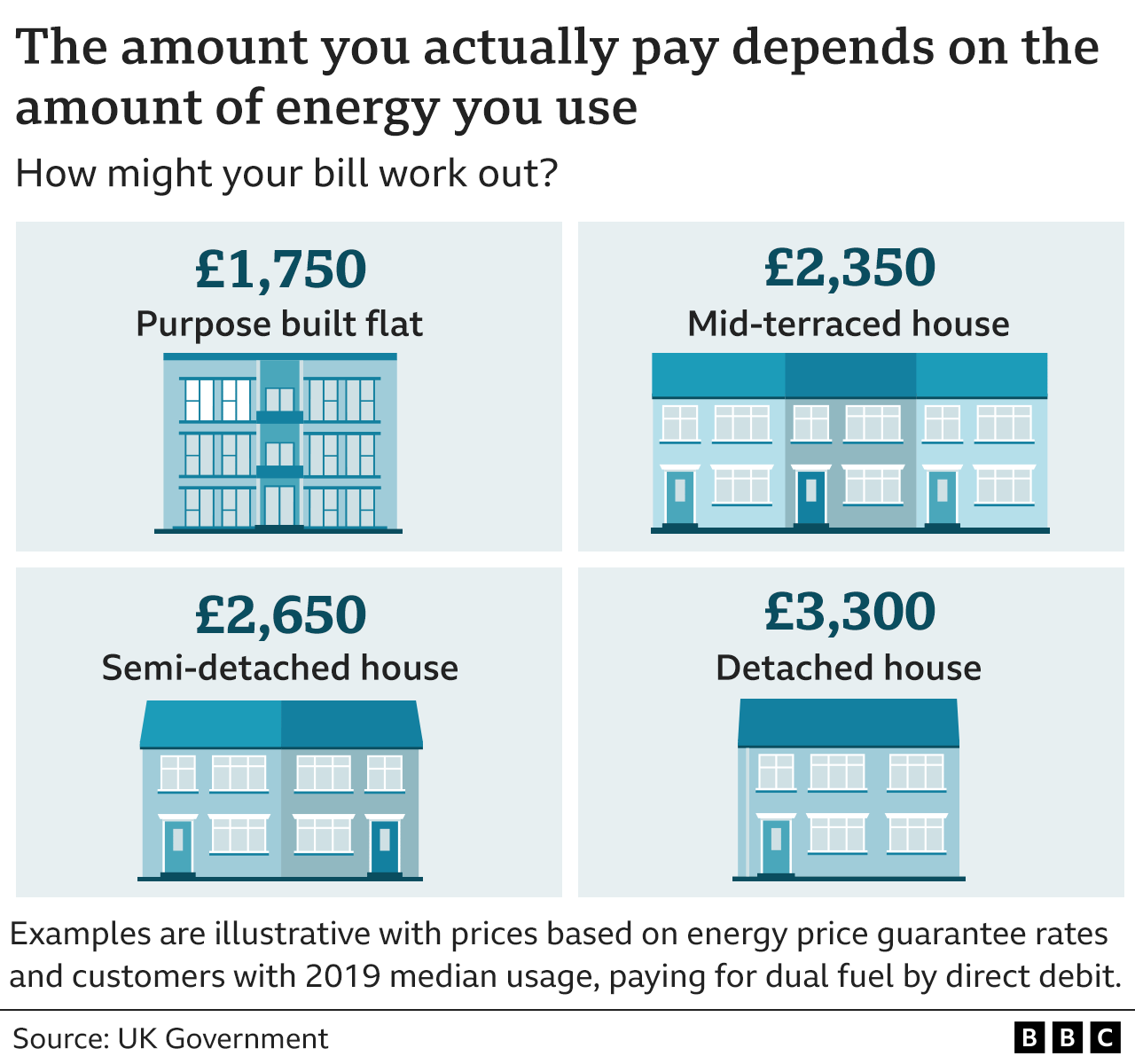Truss wrong to say energy bills capped at £2,500
- Published
Listen: Prime Minister Liz Truss grilled by BBC local radio stations
Prime Minister Liz Truss was repeatedly questioned about problems facing the economy, during a series of interviews with BBC local radio stations.
It follows turmoil on the financial markets prompted by the government's mini-budget. She spoke at length about government help with energy bills.
We've looked at some of her claims.
'Through the energy price guarantee the maximum [energy bill] will be £2,500'
The prime minister incorrectly told more than one station that there would be a maximum energy bill of £2,500 after the energy price cap is increased on 1 October.
That is not right - the energy price cap is the maximum amount that can be charged per unit of energy.
The bill will be higher or lower depending on the amount of energy used.
The £2,500 is the maximum charge for the energy use of a typical household. Ms Truss did tell some (but not all) of the radio stations that it was the maximum for a "typical bill".
But a high energy user could end up spending considerably more.

'We've also taken action on tax to reduce the tax burden to make sure we're avoiding an economic slowdown'
The Bank of England warned in August that the UK economy would shrink in the last three months of 2022 and keep shrinking until the end of 2023. That would be a considerable economic slowdown and a long recession.
Then, the day before the mini-budget, it raised rates and warned that the economy could already be in recession.
Normally for a set of announcements on the scale of the mini-budget - which included big tax cuts - we would have a set of forecasts from the Office for Budget Responsibility (OBR). The OBR provides independent analysis to the government.
This would give us an idea of whether an economic slowdown would be prevented by the policies announced.
But the government decided not to have OBR forecasts, which will instead accompany its government statement on 23 November.
As a result we have to look at other forecasters. The National Institute of Economic and Social Research (NIESR) says, external it expects the measures announced to shorten the recession in the UK.
It no longer expects the economy to shrink in the last three months of this year, but it is still expecting a slowdown and contraction in the first three months of 2023.
Other forecasters also expect the recession to be less severe than it would otherwise have been, but a slowdown is still expected.
'The package that we put forward on energy is likely to reduce inflation by up to 5%'
This claim was also made in Liz Truss's speech to MPs unveiling the energy price guarantee on 8 September.
Again, this sort of claim would usually be assessed by the independent OBR. That has not happened.
However, we have had analysis from the Bank of England.
It said that it was expecting the peak in inflation to be just under 11% as a result of the price cap. The previous month the Bank said inflation would rise to just over 13% - so a cut of about two percentage points.
A report from the accountancy firm KPMG, external agreed with the prime minister's estimate of a five percentage point reduction in the peak inflation rate.
But NIESR said, external that the energy price guarantee would reduce it by two percentage points. It also said it would mean it takes longer for inflation to fall to the Bank of England's 2% target again.
'Often you get more revenue with lower taxes'
The prime minister also made this claim several times during the leadership election, sometimes referring to corporation tax, which is paid by companies on their profits.
The government decided to cancel plans to increase corporation tax from 19% to 25% in April 2023.
The Institute for Fiscal Studies (IFS) think tank says that a Treasury forecast of the £15.4bn a year cost of this decision does not take into account a likely increase in investment. It says that should boost growth and mean that "the long-run cost of the policy will almost certainly be lower than this".
But the IFS is also clear: "The cut will not pay for itself."
It is also very hard to tell if lower taxes have, as the prime minister argues, led to higher revenues.
For example, the money taken from corporation tax rose after 2011 despite George Osborne cutting the headline rate.
The OBR said, external that was partly because of company profits recovering following the 2008 financial crisis and also because Mr Osborne reduced the amount of tax that companies were allowed to claim back to help fund investment, which made his tax cut less generous.


